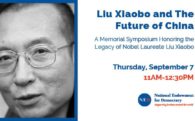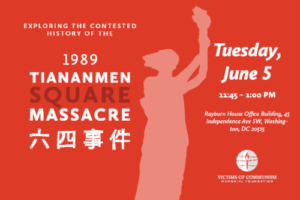 The United States urged China to account for the “ghosts'” of a crackdown on student-led pro-democracy protests in and around Beijing’s Tiananmen Square in 1989 as tens of thousands in Hong Kong held a candlelight vigil for the victims, France24 reports.
The United States urged China to account for the “ghosts'” of a crackdown on student-led pro-democracy protests in and around Beijing’s Tiananmen Square in 1989 as tens of thousands in Hong Kong held a candlelight vigil for the victims, France24 reports.
After confronting what it considered an existential threat to its rule, China’s ruling Communist party has spent the intervening decades cementing near absolute control over all aspects of governance, the FT adds.
 “We are even farther from democracy today than we were in 1989,” said Teng Biao (right), a prominent Chinese rights lawyer in exile. “That a nonviolent democratic movement was suppressed by tanks and guns and ended in a tragic massacre had big influence on the economy and markets, but the political system did not develop in tandem.”
“We are even farther from democracy today than we were in 1989,” said Teng Biao (right), a prominent Chinese rights lawyer in exile. “That a nonviolent democratic movement was suppressed by tanks and guns and ended in a tragic massacre had big influence on the economy and markets, but the political system did not develop in tandem.”
Organizers of this year’s event have seized on the death the Nobel Peace Prize laureate Liu Xiaobo, prominently displaying a bust of him in the city’s Times Square and bringing it to Monday night’s vigil. Democracy activists have been calling for the release of his widow, Liu Xia, who is under house arrest, the New York Times reports.
 In the years following the Tiananmen massacre, Liu became the world’s most eloquent and impassioned voice for democracy and human freedom, the National Endowment for Democracy’s Carl Gershman notes. Liu understood the enormity of the challenge he faced as a dissident democrat defying the power of the authoritarian Chinese state, he writes for World Affairs Review:
In the years following the Tiananmen massacre, Liu became the world’s most eloquent and impassioned voice for democracy and human freedom, the National Endowment for Democracy’s Carl Gershman notes. Liu understood the enormity of the challenge he faced as a dissident democrat defying the power of the authoritarian Chinese state, he writes for World Affairs Review:
But he remained hopeful about the prospect for democracy in China because he saw the economic, ideological, and political pillars of Chinese totalitarianism eroding under the impact of the forces of modernization and technological change. He believed that such forces were changing not just the institutions of China but also the consciousness of the people.
 In his famous essay “To Change a Regime by Changing a Society,” published in 2006, Liu wrote that dissidents could no longer be cowed into submission by the repressive regime. “Political persecution can still bring economic loss and the loss of personal freedom, but it can no longer destroy a person’s reputation or turn a person into a political leper. Indeed, today it can have the opposite effect—not merely failing to destroy one’s dignity or spirit but actually helping a person to achieve spiritual wholeness, and even, in the view of others, to rise to the status of ‘conscience of the people’ or ‘hero of truth.’”
In his famous essay “To Change a Regime by Changing a Society,” published in 2006, Liu wrote that dissidents could no longer be cowed into submission by the repressive regime. “Political persecution can still bring economic loss and the loss of personal freedom, but it can no longer destroy a person’s reputation or turn a person into a political leper. Indeed, today it can have the opposite effect—not merely failing to destroy one’s dignity or spirit but actually helping a person to achieve spiritual wholeness, and even, in the view of others, to rise to the status of ‘conscience of the people’ or ‘hero of truth.’”
The chairs of the bipartisan Congressional-Executive Commission on China reiterated their call for the Chinese government to end prohibitions of public and online discussion about the event, and reaffirmed their support for robust enforcement of “Tiananmen sanctions” and other export controls that limit the ability of Chinese police and security forces to buy U.S. technology for surveillance, crowd control, and censorship.
- CECC Resources on Tiananmen & its Legacy: The CECC Political Prisoner Database has 435 records of individuals currently or formerly detained for participating in the pro-democracy demonstrations in spring 1989, seeking redress for Chinese government violence on or around June 4, 1989, or trying to commemorate June Fourth. Highlighted below are some cases of those detained or silenced for peacefully advocating for the same human rights and political reforms that inspired the pro-democracy protesters in 1989:
-

Human Rights House
Liu Xia (right): Wife of the late writer and Nobel Peace Prize laureate Liu Xiaobo whom authorities first detained as an alleged “black hand” behind the Tiananmen protests, Liu Xia remains under extrajudicial confinement at her home for the eighth year. …
- Huang Qi: Citizen journalist and founder of the rights monitoring website 64 Tianwang Human Rights Center, Huang was detained in November 2016 and charged with “illegally providing state secrets overseas…
- Qin Yongmin: A prominent democracy advocate, Qin has been detained without trial since January 2015, reportedly facing charges of “subversion of state power”….
- Zhen Jianghua: A human rights activist and citizen journalist, Zhen was detained in September 2017. Zhen is an executive director of Human Rights Campaign in China,….
- Tiananmen Mothers: A group of parents and family members of the victims of the violent suppression of the pro-democracy demonstrations in spring 1989, the Tiananmen Mothers continue to press for government accountability and redress. ….
 Panel Discussion: Exploring the Contested History of Tiananmen Square
Panel Discussion: Exploring the Contested History of Tiananmen Square
Join the Victims of Communism Memorial Foundation on June 5th for an expert panel discussion on the relevance of the Tiananmen Square Massacre today, and for the presentation of the Foundation’s Human Rights Award Fang Zheng, who had both of his legs crushed by an oncoming tank in Tiananmen Square after pushing one of his schoolmates to safety. Speakers: Yang Jianli, president of Initiatives for China; Natalie Liu, reporter for Voice of America; Robert Suettinger, senior adviser at the Stimson Center; Fang Zheng, president of the Chinese Democracy Education Foundation; and Peter Mattis, research fellow in China studies at the Victims of Communism Memorial Foundation.
Tuesday, June 5 12:00 PM – 1:00 PM. Rayburn House Office Building, Room 2043, Capitol Hill. RSVP here.







